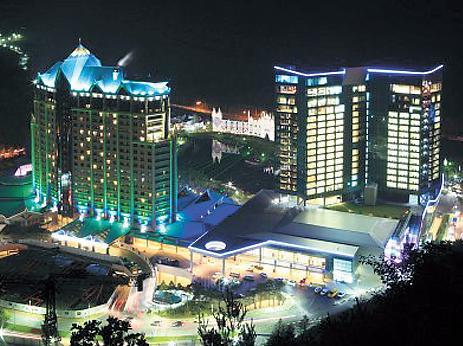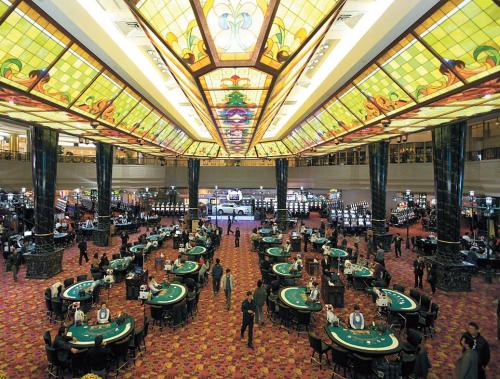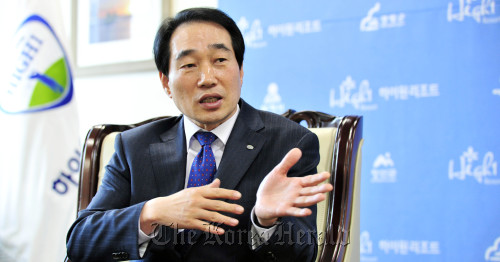[Meet the CEO] Kangwon Land aims to be more than casino
By Shin Hyon-heePublished : Feb. 21, 2012 - 14:46
CEO vows to tackle social bias and external pressure, while planting sound gaming culture at resort complex
Corruption, bankruptcy and broken homes have been typical of the images of gambling in the minds of Koreans. The risks of addiction and ethical degradation have also put the gaming business under heavy government regulations and civic scrutiny.
Kangwon Land, the sole domestic casino complex accessible to Koreans, is striving to head off these hurdles as it seeks to establish gambling as a lucrative industry and bring tourism cash to the provincial economy.
The bustling casino-hotel complex was launched in 2000 in a government initiative to resuscitate moribund coal mining towns in southern Gangwon Province.


Twelve years on, the mega project remains controversial. While the casino is inundated with visitors, its economic impact appears to have barely spilled over into the surrounding area. Other than motels and pawnshops, a handful of shops and restaurants remained open even just outside the resort complex.
In the eyes of chief executive Choi Heung-jip, however, Kangwon Land is merely on the verge of becoming the most vital force behind the regional economy.
Rather, social biases against casinos, political pressure and negative media coverage have combined to constrain the listed firm from taking off, he said in a recent interview with The Korea Herald.
“All our staff are unjustly branded as the seeds of black money and corruption while working hard, because of a few misdeeds of a few dating back a few years,” Choi says, referring to embezzlement and bribery scandals engulfing top executives and habitual gambling charges brought against high-flying entertainers in recent years, among others.
About 64 percent of 4,600 employees of Kangwon Land grew up in the region, he says. That includes 1,200 workers who manufacture goods or provide services for the company.
A Gangwon native himself, Choi has pledged to dispel the negative image and transform the company into a full-fledged hotel and leisure center since taking office in July. The 61-year-old chief executive held various posts in the Gangneung city and provincial governments before serving as a vice governor in 2008-09.
“From outside, Kangwon Land may well be regarded as a casino. But come here and see for yourself ― it’s simply one component of a booming resort complex,” Choi says.

Kangwon Land certainly offers more than gambling. It also operates two hotels, a condominium, an 18-slope ski resort, a golf course and a convention venue. A water park will be added by 2015.
Nonetheless, the casino generates about 95 percent of total revenues. Sales shot up nearly 14-fold to around 1.27 trillion won ($1.13 billion) last year from 91 billion won in 2001. The number of guests rocketed to 4.5 million from less than 210,000 over the same period.
Kangwon Land maintains a monopoly for Koreans under a special law. Majority-owned by the government, the company transfers more than 10 percent of its revenues to the public coffers through taxes and a tourism fund.
With its business flourishing, the firm’s exclusive casino operation rights were at the center of a debate last year over whether to allow locals onto other 17 gambling floors across the country.
Sheldon Adelson of the Las Vegas Sands has been keen on Korea’s 1 trillion won and growing casino market, calling on authorities to open the door to local gamblers and foreign investors. Former Culture Minister Choung Byoung-gug was also pushing to deregulate some casinos in the country’s free economic zones and on Jeju Island.
“Korea needs large multi-complex casino resorts to gain more investment from foreigners and increase the number of tourists. It’s a worldwide trend in the casino business ― prohibition is not the best way,” says Kim Do-gon, public relations chief at GKL, a state-run casino operator.
Choi refutes the claim, saying that any policy shift would wreak havoc on Kangwon Land and ultimately the region’s economy.
“Before putting priority on commercial interests, we all have to keep in mind why the casino was built here. Reviving the local economy is its sole raison d’etre. It never existed for the sake of the casino business,” he says.
In a bid to shake off the heavy reliance on the casino and put the local economy back on its feet, Choi formulated a long-term growth framework for Kangwon Land and the four mining towns ― Jeongsun, Taebaek, Donghae and Samcheok.
Under its 2020 vision, the company aims to jack up the number of annual visitors to 10 million, unearth new business areas such as a theme park, shopping and exhibitions, and improve living conditions and infrastructure in the area.
It allocated almost 550 billion won to boost tourism and spur the industrial development by installing entertainment, leisure and cultural facilities in surrounding locales.
To alleviate public and political concerns, Kangwon Land caps the number of visits to the casino to one day per month for villagers and 20 days for other guests. It also runs a gambling addiction center to provide a mix of mandatory and voluntary consultation and therapy for frequent visitors. The firm spends about 20 billion won every year on social contribution programs.
In March, the company launched a bakery as a social enterprise with 17 former gambling addicts. A small bread factory will be completed next month alongside a dormitory and gym.
“Before our exclusive casino license expires in 2025, we’ll make Korea’s best vacation spot at an altitude of some 1,000 meters that underpins the regional economy, iron out the regional strife and creates jobs,” Choi says.
By Shin Hyon-hee (heeshin@heraldcorp.com)



![[Exclusive] Korean military set to ban iPhones over 'security' concerns](http://res.heraldm.com/phpwas/restmb_idxmake.php?idx=644&simg=/content/image/2024/04/23/20240423050599_0.jpg&u=20240423183955)

![[Graphic News] 77% of young Koreans still financially dependent](http://res.heraldm.com/phpwas/restmb_idxmake.php?idx=644&simg=/content/image/2024/04/22/20240422050762_0.gif&u=)



![[Pressure points] Leggings in public: Fashion statement or social faux pas?](http://res.heraldm.com/phpwas/restmb_idxmake.php?idx=644&simg=/content/image/2024/04/23/20240423050669_0.jpg&u=)









